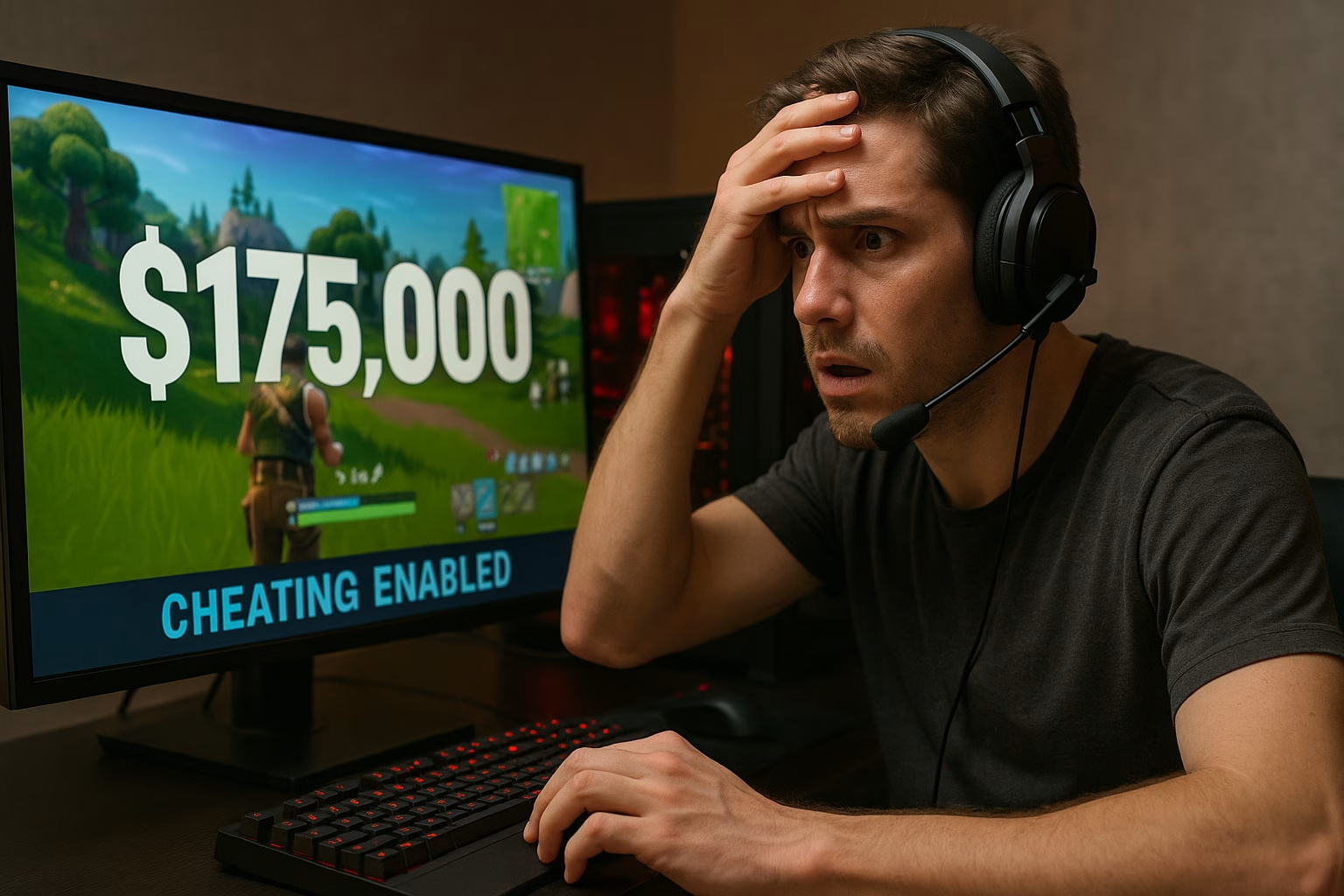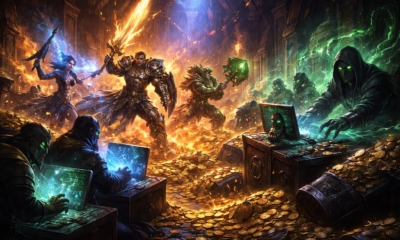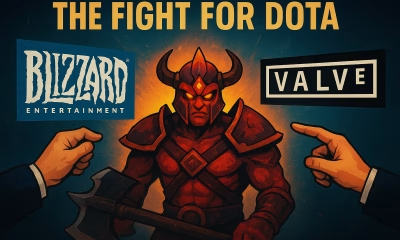Doping & Cheating
Fortnite Tournament Cheater Faces USD 175,000 Legal Bill

Table of Contents
The Battle Bus to Court: What Happened?
When California player Sebastian Araujo dropped into Fortnite tournaments with some unauthorized “enhancements,” he probably did not expect to land in Federal court. But that’s exactly where this battle royale ended after Epic Games first filed suit against the alleged cheater in December 2024. Araujo now leaves the Fortnite metaverse with a USD 175,000 judgment and a lifetime ban.
According to court documents, Araujo used software that automatically aimed for him and let him see through walls that helped him compete in 839 cash tournaments within just four months, allegedly netting him at least USD 6,850 in prize money.
But when Epic’s legal storm began closing in, he did not stop even after being banned on 6 June 2024. Instead, Araujo created at least three fake accounts between June and October 2024 to avoid being caught, using hardware spoofers to circumvent Epic’s anti-cheat systems. As they say in the game, “Maturity is when you realize, that the walls won’t protect you forever. You’ve got to let it go at some point.” Araujo’s backdoor accounts couldn’t protect him from Epic’s legal team.
The Legal Loadout: Epic’s Arsenal of Claims
Epic Games did not just report Araujo to in-game moderators-they brought out the legal artillery. The lawsuit, filed in the U.S. District Court for the Central District of California (Case No. 2:24‑cv‑10835), accused Araujo of multiple violations including:
- Breach of Contract: By violating Fortnite’s Terms of Service and tournament rules
- Copyright Infringement: Through unauthorized modification of the game client
- DMCA Violations: For circumventing technological protection measures
Epic Games emerged victorious on 24 June 2025, securing a default judgment of USD 168,550 for DMCA and Copyright Act violations. The message is crystal clear: Do not spend too much time looting (or in this case, cheating), you might not even get the chance to use the prize money.
Default Judgment: When Ignoring a Lawsuit Goes Wrong
Perhaps the most perplexing part of this saga? Araujo’s decision to ignore the legal proceedings entirely. This resulted in the Court entering a default judgment on 25 June 2025, transforming what might have been a negotiable situation into a crushing defeat.
As the Court noted: “While the Court notes the amount sought by Plaintiff exceedingly surpasses Defendant’s alleged actual gain, USD 6,850, Defendant took significant measures to conceal the true scope of his cheating activities”. Ultimately, the Court’s decision exemplified that the cover-up is oftentimes worse than the crime.
The Broader Battle Royale Against Cheating
This case is far from Epic’s first rodeo in the legal arena. The company has been “ramping up legal action” against cheaters, with several notable victories:
- In February 2025, Epic forced another cheater named “Repulse God” to not only return prize money but also publish a public apology on their YouTube channel.
- In 2022, Epic won a lawsuit against an Australian Fortnite cheater, and donated the settlement money to charity.
- Epic has also targeted cheat developers and distributors directly.
True to form, Epic announced they’ll donate whatever they collect from Araujo to charity, specifically Child’s Play, which provides toys and games to children in hospitals. For Epic, losing cheaters from their game is just an opportunity to, as the game says, “shine brighter” through charitable giving.
Beyond Software: Legal Risks in Competitive Gaming
While Araujo’s case centered on software cheats, the esports legal landscape extends far beyond hacking. Players face potential liability under multiple legal theories that many don’t even consider.
Match-Fixing and Fraud
Beyond software cheats lies an even murkier legal territory. When players intentionally throw matches for profit, they risk civil fraud claims from employers and sponsors, unfair competition claims from rival players, and potential criminal charges under wire fraud statutes. Recent VALORANT match-fixing allegations even involved claims of blackmail to ensure continued compliance, adding extortion to the list of potential charges.
Regulatory Enforcement
The Esports Integrity Commission (ESIC) has emerged as a de facto regulatory body, though its power remains contractual rather than legal. ESIC’s recent sanctions against “Goon” for betting on his own matches resulted in a nine-month ban, demonstrating that even non-criminal violations carry serious consequences. However, ESIC’s reach depends entirely on whether tournament organizers adopt their codes, creating an inconsistent enforcement landscape.
Intellectual Property Violations
Publishers increasingly view game modifications through an IP lens. What players see as harmless mods or cheats, companies frame as copyright infringement and DMCA violations. Nintendo alone has pursued cases ranging from streaming violations seeking millions in damages to criminal convictions for hardware modifications. This aggressive stance transforms every unauthorized modification into potential legal exposure.
Modern esports operates in a complex web of contract law, intellectual property rights, criminal statutes, and industry-specific regulations. Players who think they’re just bending game rules may actually be breaking real laws with real legal consequences.
Lessons for the Lobby: What This Means for Competitive Gaming
This case should be a warning shot to any potential cheaters looking to game the system, a “Victory Royale”-sized message to the competitive gaming community: cheat at your own financial risk. Even the winners are dragged back to the lobby, and in Araujo’s case, that lobby came with a USD 175,000 legal bill.
For legitimate competitors, this ruling represents a win for fair play. It shows that publishers are willing to protect the integrity of their tournaments through legal channels, not just technical ones. The case also highlights several critical lessons:
- Terms of Service Are Legally Binding: Those click-through agreements create enforceable contracts that can lead to six-figure judgments.
- Default Judgments Are Real: Ignoring a lawsuit doesn’t make it disappear—it guarantees you lose, big-time.
- The Multiplier Effect: Cheating your way to USD 6,850 in prize money cost Araujo USD 175,000—a 25x penalty that should give any would-be cheater pause.
- Industry-Wide Cooperation: With publishers, ESIC, and law enforcement increasingly coordinating together, the enforcement net continues to tighten.
As corporate brand partnerships and gaming sponsorships proliferate, the reputational damage from corruption may expose teams and tournaments to mounting lawsuits. This creates a ripple effect where cheating threatens the entire ecosystem’s credibility and financial stability.
As esports continues to mature into a multi-billion dollar industry, we’re witnessing the professionalization of competitive gaming enforcement. Epic’s willingness to pursue six-figure judgments over relatively small prize pools sends a clear message: the days of consequence-free cheating are over. Whether it’s software hacks, match-fixing, or IP violations, the legal walls protecting the integrity of competitive gaming are being built higher and stronger every day.



















